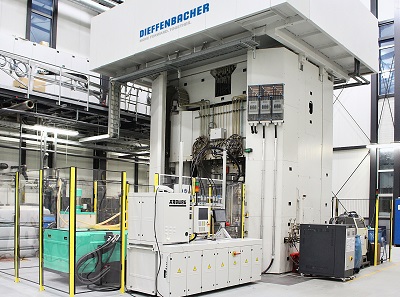Dieffenbacher and Arburg, both family-owned companies from Baden-Württemberg, will in future cooperate to develop new solutions for the transfer molding of hybrid components. This allows them to combine their expertise in the fields of press systems and automated presses as well as injection molding technology, bringing together the advantages of both worlds.
Arburg and Dieffenbacher recently demonstrated their successful cooperation as part of the MoPaHyb research project "Modular production plant for heavy-duty hybrid components", which was funded by the German Federal Ministry of Education and Research (BMBF). Together with Fraunhofer ICT, Pfinztal, and nine other partners, a modular production system for hybrid components was developed and realized. It combines a size 4,600 modular injection unit for fibre direct compounding (FDC) from Arburg with a Dieffenbacher 3,600-ton vertical press located at the ICT. The system makes it possible to implement component dimensions and complexities that could not be manufactured before.
"The subject of lightweight construction is an important one at Arburg," according to Gerhard Böhm, Managing Director Sales at Arburg. "We offer various processes and solutions, including the FDC process. Combining it with transfer molding is a forward-looking concept that enables new lightweight construction applications.” Manfred Reif, Head of the Composites Business Unit at Dieffenbacher, said: “Based on the positive results achieved in the MoPaHyb project, we will in future also be offering Dieffenbacher transfer moulding presses in combination with an Arburg FDC injection unit. Together with our Fiberforge UD tape laying system and the Fibercon consolidation unit, we can offer our customers a strong overall package.”

Particularly for parts with very thin wall thicknesses, injection molding offers a material-friendly and efficient manufacturing process. Geometric reinforcements in the form of ribbed structures as well as local or full-surface reinforcements using unidirectional tapes in combination with fiber-reinforced in-mold lamination open up numerous new areas of application, especially for structural applications. The advantage of using a Dieffenbacher press as a clamping unit is that reinforcing inserts can simply be inserted into the horizontal mould.
Arburg's Fiber Direct Compounding (FDC) injection process allows fibres to be added directly to the plastic melt. The fiber length, fiber content and material combination can be adapted on an individual basis to influence the part properties in a targeted manner.
By combining transfer moulding and FDC injection molding, hybrid components can be produced very economically and flexibly. Dieffenbacher will be presenting this concept at K 2019 in Düsseldorf from 16 to 23 October in Hall 14, Stand A02.














